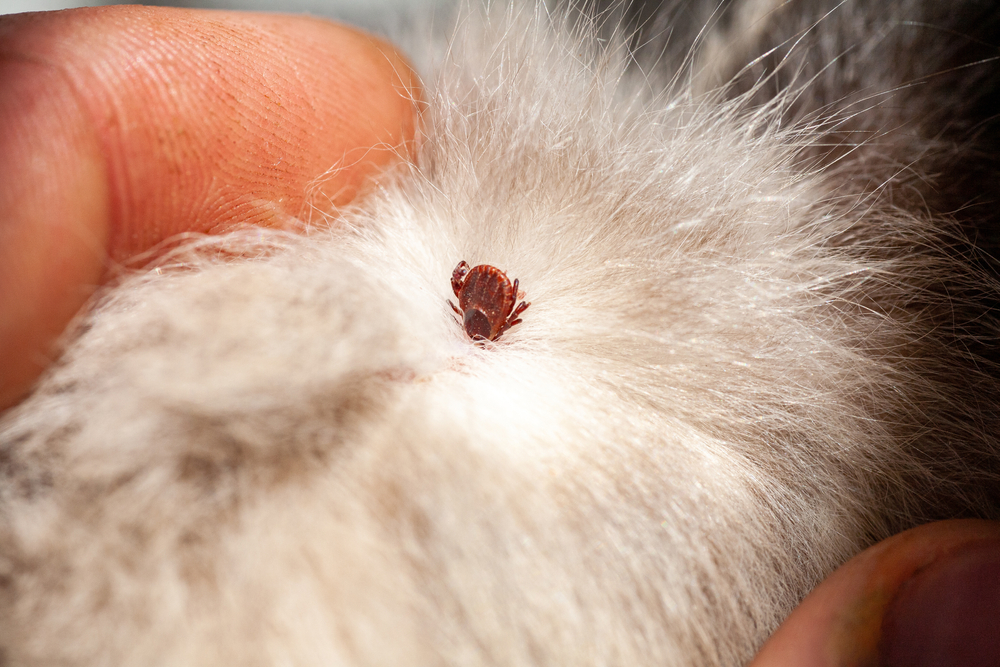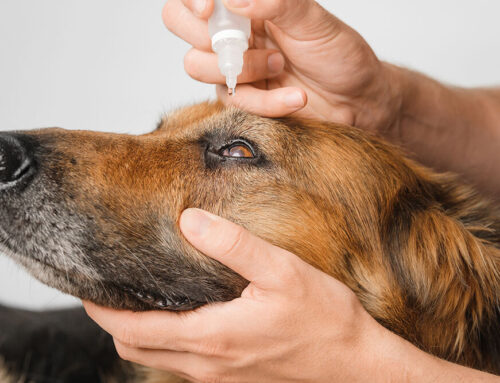Many pets are affected by parasites during their lifetime, and these diseases can cause significant health issues. Our veterinarians in south Austin want to help you and your pet by answering some frequently asked questions about parasitic pet diseases.
Question: How are parasites transmitted to my pet?
Answer: Many different parasites target pets, including:
- Heartworms — Heartworms, which are transmitted by mosquitoes, can significantly damage your pet’s heart and lungs.
- Intestinal parasites — Parasites, such as hookworms, roundworms, whipworms, and tapeworms, reside in your pet’s gastrointestinal tract. Your pet is infected when they ingest a parasite egg from their environment. Hookworms and roundworms can also be transmitted when your pet eats an infected bird or small animal. Puppies and kittens can be infected in utero or through their mother’s milk.
- Protozoa — Protozoa, such as Toxoplasma gondii, Giardia duodenalis, and coccidia, are transmitted when your pet ingests an oocyst from their environment.
- Ticks — Ticks transmit several diseases, including Lyme disease, Rocky Mountain spotted fever, ehrlichiosis, and anaplasmosis.
Q: What signs do parasites cause in pets?
A: Different parasites affect pets differently.
- Heartworms — Dogs are a natural host for heartworms, whereas cats are an atypical host, which means the heartworms affect them differently.
- Dogs — In the initial stages, dogs frequently don’t show signs, but as their condition worsens, signs include lethargy, a soft, persistent cough, and weight loss. Dogs can die suddenly if the heartworms block blood flow through the heart.
- Cats — When the parasites reach the cat’s lungs, the cat’s immune system mounts a severe inflammatory response, causing coughing, increased respiratory effort, and wheezing.
- Intestinal parasites — Most healthy, adult pets who have intestinal worms exhibit no signs, but puppies, kittens, and immunocompromised pets may have issues that include weight loss, poor hair coat, pot-bellied appearance, vomiting, and diarrhea.
- Protozoa — The most common sign seen with coccidiosis and giardiasis is diarrhea. Cats are the primary host for T. gondii, and infected cats typically exhibit no signs. Healthy dogs may also not exhibit signs but, if present, signs include fever, diarrhea, muscle weakness, and eye inflammation.
- Tick-borne diseases — Most tick-borne diseases cause non-specific signs, such as fever, lethargy, joint pain, and lymph node enlargement. Other less common signs include:
- Lyme disease — Serious kidney complications, causing increased thirst and urination, decreased appetite, and vomiting
- Rocky Mountain spotted fever — Facial or limb swelling, pinpoint hemorrhages in the eyes and gums, nosebleeds, and neurological signs
- Ehrlichiosis — Lameness, eye problems, bleeding disorders, and neurological disturbances
- Anaplasmosis — Decreased appetite, vomiting, coughing, and labored breathing
Q: How are parasitic pet diseases diagnosed?
A: Some parasitic diseases are diagnosed through blood tests, while others require a fecal examination.
- Heartworms — Different tests are usually needed to diagnose heartworm disease in dogs and cats.
- Dogs — A blood antigen test is used to detect proteins from an adult female heartworm. Some veterinarians also perform a modified Knott’s test to look for microfilariae (i.e., baby heartworms).
- Cats — Heartworms don’t usually grow to adulthood in cats, meaning the antigen test used in dogs won’t detect the infection, but an antibody blood test can detect larval infections as early as two months post infection. X-rays and ultrasound imaging may also be necessary to make a diagnosis.
- Intestinal parasites — Tapeworms are often diagnosed when segments are seen on the pet’s hind end or in their feces. Roundworms, whipworms, and hookworms are diagnosed by microscopically evaluating the pet’s feces.
- Protozoa — Coccidiosis and giardiasis are diagnosed by performing a special zinc sulfate flotation on the pet’s feces. Toxoplasmosis is diagnosed by measuring the toxoplasma antigen levels in the pet’s blood.
- Tick-borne diseases — Blood tests to detect antibodies to the pathogens causing the diseases are used to diagnose Lyme disease, ehrlichiosis, anaplasmosis, and Rocky Mountain spotted fever.
Q: How are parasitic pet diseases treated?
A: Parasitic disease treatments include:
- Heartworms — The pet’s activity level is restricted, since exercise can exacerbate the parasites’ damage. Treatment varies for cats and dogs.
- Dogs — Medications are administered over several months to kill the heartworms at all life stages. Treatment is dangerous, and the dog’s condition must be closely monitored.
- Cats — No treatment is available to address heartworm disease in cats, and management focuses on decreasing the lung inflammation and supportive care.
- Intestinal parasites — Treatment involves administering an appropriate deworming medication.
- Protozoa — Protozoal infections are typically treated using a combination of antibiotics and anti-parasitic medications.
- Tick-borne diseases — Most tick-borne illnesses respond to a particular antibiotic class.
Q: How are parasitic pet diseases prevented?

A: Most parasitic diseases can be easily prevented.
- Heartworms — Heartworms can be prevented by testing your pet once a year and providing year-round heartworm prevention medication.
- Intestinal parasites — Scoop your cat’s litter box frequently, and remove your dog’s feces from your yard regularly. In addition, don’t let your pet ingest birds or small mammals. Many heartworm prevention medications provide coverage for intestinal parasites, so providing year-round protection will protect your pet from many concerning parasites.
- Protozoa — Don’t let your pet ingest birds or small mammals, keep your cat’s litter box clean, and remove your dog’s waste material regularly.
- Tick-borne diseases — Check your pet for ticks after they have been outside, and provide year-round flea and tick prevention medication. A vaccine is available to protect your dog against Lyme disease, and you should talk to our south Austin veterinarians if you think your dog can benefit.
Take the necessary precautions to protect your four-legged friend against concerning parasites. If your pet is due for a heartworm test or a fecal check, contact our veterinarians in south Austin at Oliver Animal Hospital, so we can ensure your pet is parasite free.







Leave A Comment